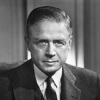Thomas Watson, Jr.

Thomas Watson, Jr.
Thomas John Watson Jr.was an American businessman, political figure, and philanthropist. He was the 2nd president of IBM, the 11th national president of the Boy Scouts of America, and the 16th United States Ambassador to the Soviet Union. He received many honors during his lifetime, including being awarded the Presidential Medal of Freedom by Lyndon B. Johnson in 1964. Watson was called "the greatest capitalist in history" and one of "100 most influential people of the 20th century"...
NationalityAmerican
ProfessionBusinessman
Date of Birth14 January 1914
CountryUnited States of America